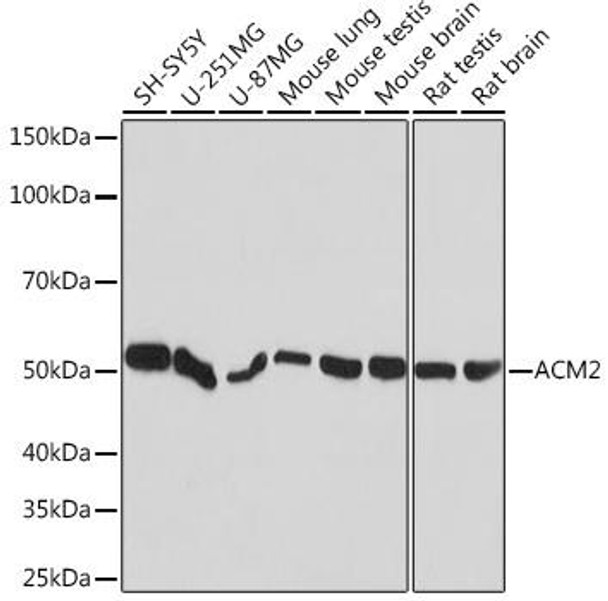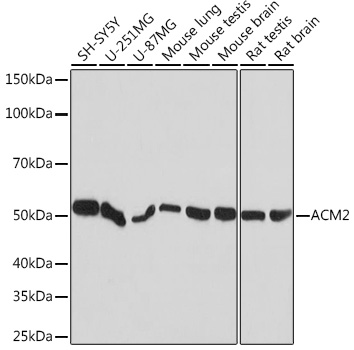Anti-ACM2 Antibody (CAB5154)
- SKU:
- CAB5154
- Product type:
- Antibody
- Reactivity:
- Human
- Reactivity:
- Mouse
- Reactivity:
- Rat
- Host Species:
- Rabbit
- Isotype:
- IgG
- Research Area:
- Cell Biology
Description
| 抗体名: | Anti-ACM2 Antibody |
| 抗体コード: | CAB5154 |
| 抗体サイズ: | 20uL, 50uL, 100uL |
| 申し込み: | WB IHC |
| 反応性: | Human, Mouse, Rat |
| 宿主種: | Rabbit |
| 免疫原: | A synthesized peptide derived from human ACM2 |
| 申し込み: | WB IHC |
| 推奨希釈: | WB 1:500 - 1:2000 IHC 1:50 - 1:200 |
| 反応性: | Human, Mouse, Rat |
| ポジティブサンプル: | SH-SY5Y, U-251MG, U-87MG, Mouse lung, Mouse testis, Mouse brain, Rat testis, Rat brain |
| 免疫原: | A synthesized peptide derived from human ACM2 |
| 精製方法: | Affinity purification |
| ストレージバッファ: | Store at -20'C. Avoid freeze / thaw cycles. Buffer: PBS with 0.02% sodium azide, 0.05% BSA, 50% glycerol, pH7.3. |
| アイソタイプ: | IgG |
| 順序: | Email for sequence |
| 遺伝子ID: | 1129 |
| Uniprot: | P08172 |
| セルラーロケーション: | |
| 計算された分子量: | 52kDa |
| 観察された分子量: | 52KDa |
| 同義語: | HM2 |
| バックグラウンド: | The muscarinic cholinergic receptors belong to a larger family of G protein-coupled receptors. The functional diversity of these receptors is defined by the binding of acetylcholine to these receptors and includes cellular responses such as adenylate cyclase inhibition, phosphoinositide degeneration, and potassium channel mediation. Muscarinic receptors influence many effects of acetylcholine in the central and peripheral nervous system. The muscarinic cholinergic receptor 2 is involved in mediation of bradycardia and a decrease in cardiac contractility. Multiple alternatively spliced transcript variants have been described for this gene. [provided by RefSeq, Jul 2008] |
| UniProt Protein Function: | mAChR M2: The muscarinic acetylcholine receptor mediates various cellular responses, including inhibition of adenylate cyclase, breakdown of phosphoinositides and modulation of potassium channels through the action of G proteins. Primary transducing effect is adenylate cyclase inhibition. Genetic variations in CHRM2 can influence susceptibility to major depressive disorder (MDD). MDD is one of the most common psychiatric disorders. MDD is a complex trait characterized by one or more major depressive episodes without a history of manic, mixed, or hypomanic episodes. A major depressive episode is characterized by at least 2 weeks during which there is a new onset or clear worsening of either depressed mood or loss of interest or pleasure in nearly all activities. Four additional symptoms must also be present including changes in appetite, weight, sleep, and psychomotor activity; decreased energy; feelings of worthlessness or guilt; difficulty thinking, concentrating, or making decisions; or recurrent thoughts of death or suicidal ideation, plans, or attempts. The episode must be accompanied by distress or impairment in social, occupational, or other important areas of functioning. Belongs to the G-protein coupled receptor 1 family. Muscarinic acetylcholine receptor subfamily. CHRM2 sub-subfamily. |
| UniProt Protein Details: | Protein type:GPCR, family 1; Membrane protein, multi-pass; Receptor, GPCR; Membrane protein, integral Chromosomal Location of Human Ortholog: 7q31-q35 Cellular Component: postsynaptic membrane; integral to plasma membrane; plasma membrane; cell junction Molecular Function:G-protein coupled acetylcholine receptor activity Biological Process: G-protein signaling, coupled to cAMP nucleotide second messenger; G-protein coupled receptor protein signaling pathway; nervous system development; G-protein signaling, coupled to cyclic nucleotide second messenger; elevation of cytosolic calcium ion concentration during G-protein signaling, coupled to IP3 second messenger (phospholipase C activating); acetylcholine receptor signaling, muscarinic pathway; response to virus; muscarinic acetylcholine receptor, phospholipase C activating pathway; regulation of heart contraction |
| NCBI Summary: | The muscarinic cholinergic receptors belong to a larger family of G protein-coupled receptors. The functional diversity of these receptors is defined by the binding of acetylcholine to these receptors and includes cellular responses such as adenylate cyclase inhibition, phosphoinositide degeneration, and potassium channel mediation. Muscarinic receptors influence many effects of acetylcholine in the central and peripheral nervous system. The muscarinic cholinergic receptor 2 is involved in mediation of bradycardia and a decrease in cardiac contractility. Multiple alternatively spliced transcript variants have been described for this gene. [provided by RefSeq, Jul 2008] |
| UniProt Code: | P08172 |
| NCBI GenInfo Identifier: | 113122 |
| NCBI Gene ID: | 1129 |
| NCBI Accession: | P08172.1 |
| UniProt Secondary Accession: | P08172,Q4VBK6, Q9P1X9, |
| UniProt Related Accession: | P08172 |
| Molecular Weight: | 466 |
| NCBI Full Name: | Muscarinic acetylcholine receptor M2 |
| NCBI Synonym Full Names: | cholinergic receptor, muscarinic 2 |
| NCBI Official Symbol: | CHRM2 |
| NCBI Official Synonym Symbols: | HM2 |
| NCBI Protein Information: | muscarinic acetylcholine receptor M2; 7TM receptor; muscarinic M2 receptor; acetylcholine receptor, muscarinic 2; cholinergic receptor, muscarinic 2, isoform a |
| UniProt Protein Name: | Muscarinic acetylcholine receptor M2 |
| Protein Family: | Muscarinic acetylcholine receptor |
| UniProt Gene Name: | CHRM2 |
| UniProt Entry Name: | ACM2_HUMAN |


